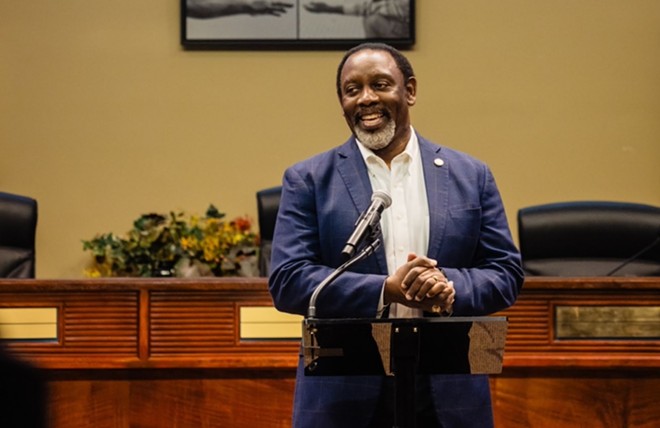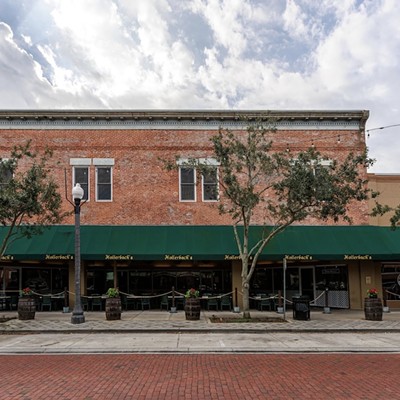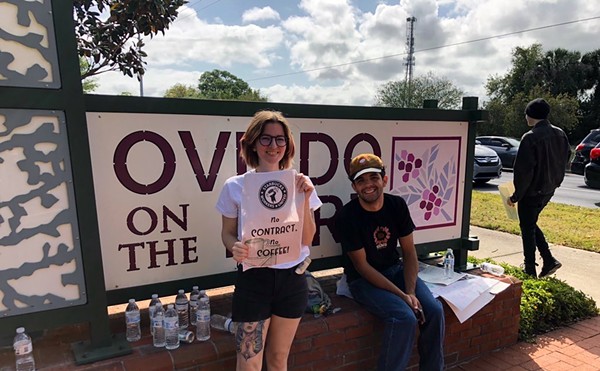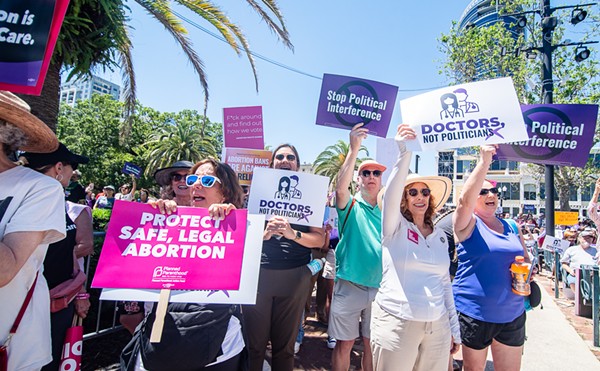Orange County commissioners decided after a lengthy discussion Tuesday to dedicate a portion of unused federal pandemic relief funds to wipe out medical debt for hundreds of thousands of debt-burdened residents.
The American Rescue Plan Act of 2021, a priority of the Biden administration, allocated $350 billion for state and local governments to provide economic relief for individuals, families and businesses.
Orange County, which received a total $270.8 million in funds, had about $23 million left to allocate, with a limited amount of time to do so. According to county staff, the county needed to have all of their funding financially obligated by the end of 2024, and spent by the end of 2026.
Other proposals — dedicating funds for affordable housing, job assistance for the unemployed, and filling a budgetary shortfall for a new fire station — were also approved Tuesday.
Medical debt, a problem exacerbated by the COVID-19 pandemic, is a leading cause of bankruptcy in the United States, affecting more than two in five U.S. adults.
Central Florida Jobs With Justice, a nonprofit coalition of local labor unions and social advocacy groups that support the initiative, estimates that a quarter-million residents in Orange County alone — roughly 17% of the county population — are saddled with medical debt, which affects not just low-income households, but middle-income households, too.
“We know that poverty and financial instability are systemic issues at their core, not individual failings,” said Tara “Glitter” Felten, an organizer with CFJWJ, during the public comment period of the board’s Tuesday meeting.
Over 90 percent of the U.S. population has some form of health insurance. But health insurance alone can be insufficient to cover the cost of a major medical procedure, treatment for cancer or chronic illness. The United States, to date, is the only industrialized country that doesn’t guarantee health care for its citizens through universal healthcare coverage.
For some, it can take just one accident, one unexpected health emergency for someone to be saddled with thousands of dollars in debt.
“Just because someone has insurance doesn't necessarily mean that they will not incur medical debt [due] to out-of-pocket-cost, deductibles and copays,” said Warren Lakhan, a family services administrator for Orange County, in a presentation to the board.
The initial request from CFWJW, based on debt estimates in Orange County, was an $8.7 million allocation for the project.
With that $8.7 million investment, using leftover funds from the American Rescue Plan Act, the county could have canceled an estimated $827 million in medical debt for 300,000 residents.
Eventually, county commissioners settled on a $4.5 million figure — aiming to balance the progressive initiative with other spending priorities.
Orange County would be the first county in Florida to launch such an initiative, according to county staff — but it would join a growing wave of other local governments across the country doing the same. It also signifies a critical way in which Orange County can take action to address debt burdens negatively affecting working families without having to wait for action from the state.
Eimar Roy, a local resident and primary caregiver of two children, told Orange County leaders that she never thought she would find herself with medical debt. Then the pandemic hit. She became unemployed, and then, became sick with COVID-19. “I am one of the unfortunate people that had pre-existing conditions that … basically caused permanent heart and other damage,” she shared. “This is not something that I was responsible for.”
Dr. Jennifer Ferreira, who works as a clinical pharmacist in a local emergency room, told commissioners that in her work she sees the damage medical debt can cause, like patients with chronic illnesses who aren’t taking their prescribed medication because they can’t afford it, or because they’re already in debt, or are uninsured.
She shared the story of one woman — an older woman in her 60s who’d recently lost her health insurance, and who was struggling to find affordable housing — as an example.
“This patient wasn't able to take any of her high cholesterol, blood pressure or diabetic medications, resulting in her body going into quite literal crisis,” said Ferreira. “I really urge you guys to do this so I don't have to see my patients struggling to access the bare necessities they deserve.”
“I really urge you guys to do this so I don't have to see my patients struggling to access the bare necessities they deserve.”
tweet this
According to KFF, about 14 million people (or 6 percent of adults) in the U.S. owe more than $1,000 in medical debt. About 3 million people (1 percent of adults) owe medical debt of more than $10,000.
The idea of using ARPA funds to cancel medical debt isn’t novel. The Associated Press reported last year that an increasing number of municipal, county and state governments — including New Orleans; Cook County, Illinois; and Toledo, Ohio — had opted to leverage portions of their federal pandemic relief funds to eliminate residents’ medical debt.
The wave of local governments opting in, according to NPR, is only growing. New York City recently hopped on board last month, and Wayne County, Michigan is also considering a similar proposal.
The first was Cook County, Illinois — home to Chicago — which pledged $12 million in ARPA funds to the cause in 2022 through a partnership with the nonprofit RIP Medical Debt. As of last October, the county had abolished over $280 million in medical debt, benefiting 158,541 residents.
Orange County has also been in talks with RIP Medical Debt, a New York-based nonprofit, and local governments they’ve worked with about how this could work in practice.
Lakhan, the family services administrator, said that because of how the process works, there’s no need to apply for medical debt relief through the program. Instead, people who have their debt cleared would receive a letter in the mail notifying them that their debt had been erased.
RIP Medical Debt, founded in 2014, is able to identify unpaid medical bills owed by people making up to four times the federal poverty level or whose medical bills total more than 5 percent of their annual household income. They work with local governments, individuals, organizations — anyone who wants to donate to the cause.
Through agreements with hospitals and health care providers, RIP Medical Debt buys debt in bundles at a fraction of the cost. For every $1 appropriated, about $100 in medical debt can be canceled. “So there is a lot of leverage in terms of the benefit provided,” said Lakhan.
Over the past decade, the nonprofit has wiped out more than $10 billion in debt, helping more than 7.1 million families, according to their website.
Central Florida Jobs With Justice initially requested an $8.7 million investment for the initiative. County staff conducted interviews with other local governments who had worked with the nonprofit, as well as the staff of RIP Medical Debt themselves to learn more about not just how the project works, but how well it’s worked.
Demings sat in for some of these discussions himself. Medical bills can trap a person in a “doom loop” between their insurance and their healthcare provider. Debt itself can hurt a person’s credit, and can pressure a person who is uninsured or who has fewer financial means to delay seeking additional medical care. It can also affect a family’s ability to cover other basic living expenses.
The problem, according to county staff, was that they’d already earmarked funds for other initiatives that could be funded using ARPA dollars. Those other proposals were: $5 million for affordable housing, $5 million to extend a contract with Career Source for job assistance assistance services, $7.7 million for a new fire station (necessary due to a budget shortfall, apparently), $1 million for the Second Harvest food bank, and $4.3 million for homelessness and mental health services.
That is, there was no money left for the $8.7 million medical debt relief plan. County staff say this is because Central Florida Jobs With Justice — the nonprofit leading the push — came to them with the idea after they’d already put together their allocation wish list.
But some commissioners questioned how the funds were divvied up. No one really wanted to touch most of what was allocated — it all seemed pretty tight, noncontroversial. Cut funds for helping the homeless or funds to address food insecurity? That’s Bad Optics 101.
But Commissioner Emily Bonilla did point to the fact that Career Source — a workforce development agency that’d already received $15.3 million in ARPA funds — still had 40% of funds from their previous allocation. Both Bonilla and Commissioner Mayra Uribe also questioned whether Career Source was actually making good use of the money they’d been given already. Both had had negative experiences trying to work with them in the past.
“They have the money to do what we had asked them to do,” said Bonilla, exasperated. “They want more money in order to do more of that, which isn't working. It just doesn't make any logical sense.”
Uribe, who had to duck out of the meeting early for another commitment, added that unemployment is low. The real problem, she said, is the low wages that are offered up by the employers desperately seeking labor in the area.
“We don’t have a job issue,” said Uribe. “We have a wage issue.”
Out of the 1,023 total job placements Career Source had achieved through its allocation of ARPA funds already, just 856 paid over $15 an hour. The average income after receiving help was just $19.55 an hour.
Rent prices in Orange County alone skyrocketed in 2021 and 2022, reaching double-digit percentage increases. While U.S. inflation has slowed, food prices are up, too. So is gas, and childcare, another major expense for working families in Orange County.
Still, other commissioners felt uneasy about slashing Career Source’s allocation entirely. “I’m just not 100% comfortable making a drastic cut to something that I know I've benefited from personally,” said Commissioner Mike Scott, who shared that he had once been unemployed for several months himself. The agency’s assistance has also helped young people out of work, he added.
Scott — the board’s newest addition, elected in 2022 — said he was “certainly in favor” of the idea of pursuing a medical debt relief program. “I've had a number of medical debt [sic] in a couple of years that did affect my credit quite severely.”
But there was disagreement on numbers. Bonilla wanted to slash Career Source out entirely to help fund the medical debt cancellation. Scott fought for a $2.5 million compromise — a 50% cut — and had some concern about the initial $8.7 million figure.
Demings, who fought surprisingly hard to ensure the debt initiative wasn’t axed, also asked county staff to see if the county could find $2 million for the fire station through other means, in order to free up some of that $7.7 million pot, too.
Altogether, the commission was able to agree on a $4.5 million figure for medical debt cancellation through both cuts. This means less debt would be canceled, likely aiding fewer people. The allocation is still subject to final approval, and should be on the board’s consent agenda for a final vote sometime this spring, a county spokesperson confirmed.
“This budget has to balance at the end of the day,” Demings conceded.
Central Florida Jobs With Justice celebrated the achievement on Instagram, with the caveat that they plan on organizing for the full $8.7 million ahead of the final vote.
“Today is a testament to the organizing efforts and unwavering persistence of community leaders who amplified their stories and fearlessly championed those burdened by medical debt,” the nonprofit posted on social media. “It not only underscores our collective power, but the notion that behind every policy charge are working people committed to uplifting their communities.”
Follow us: Apple News | Google News | NewsBreak | Reddit | Instagram | Facebook | Twitter | or sign up for our RSS Feed























